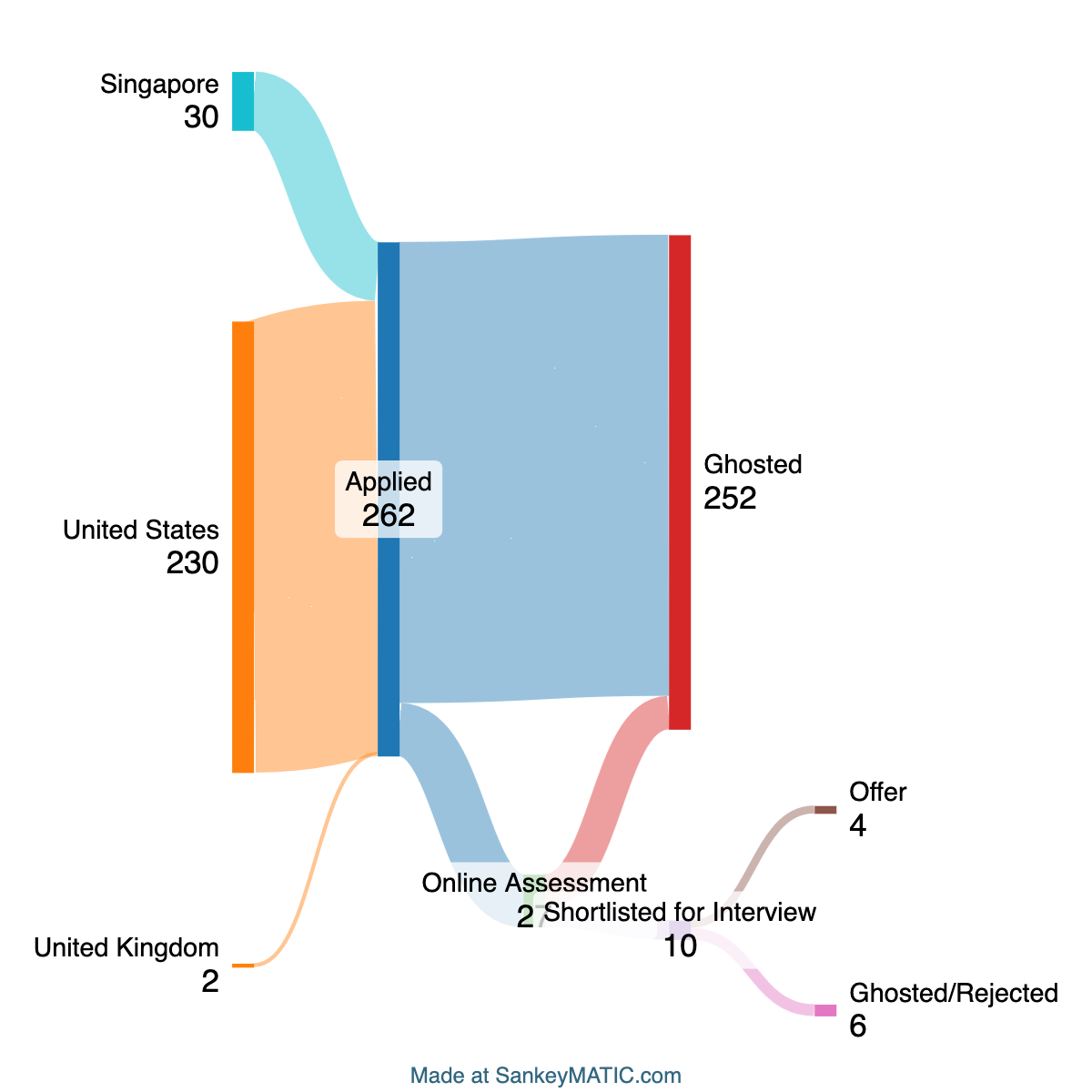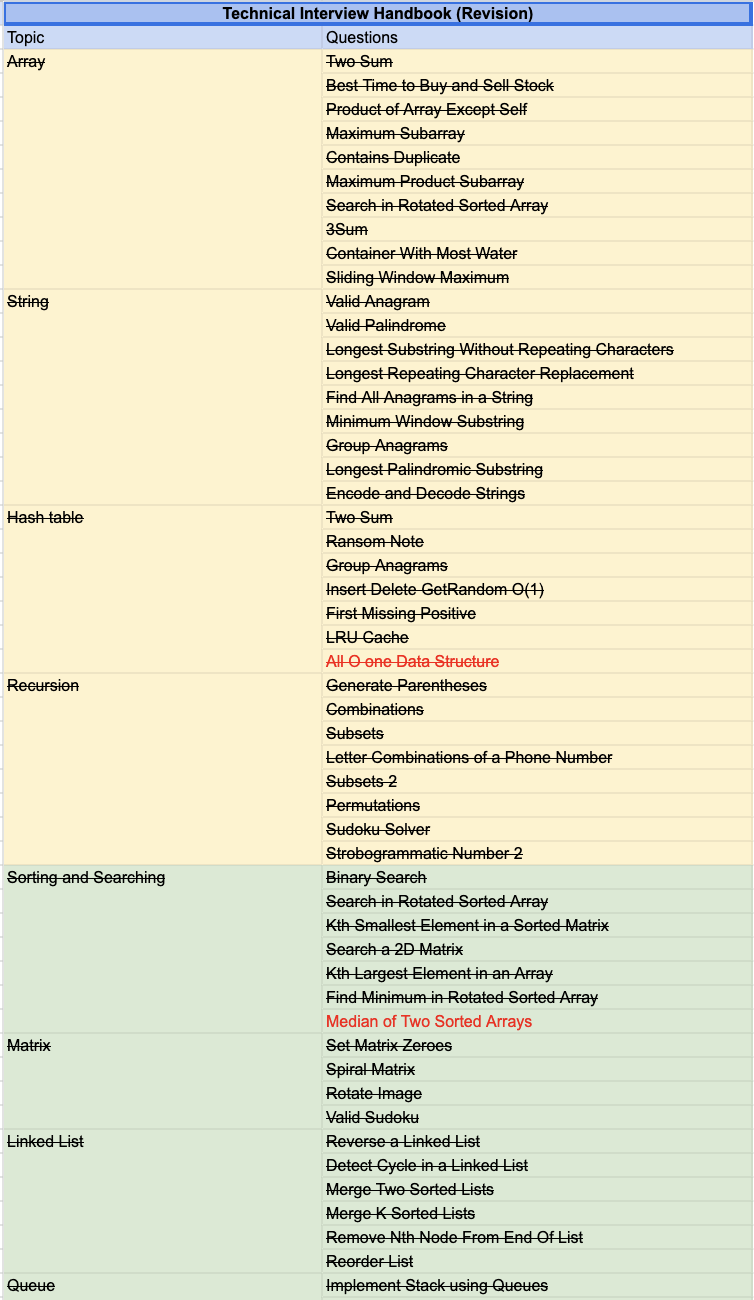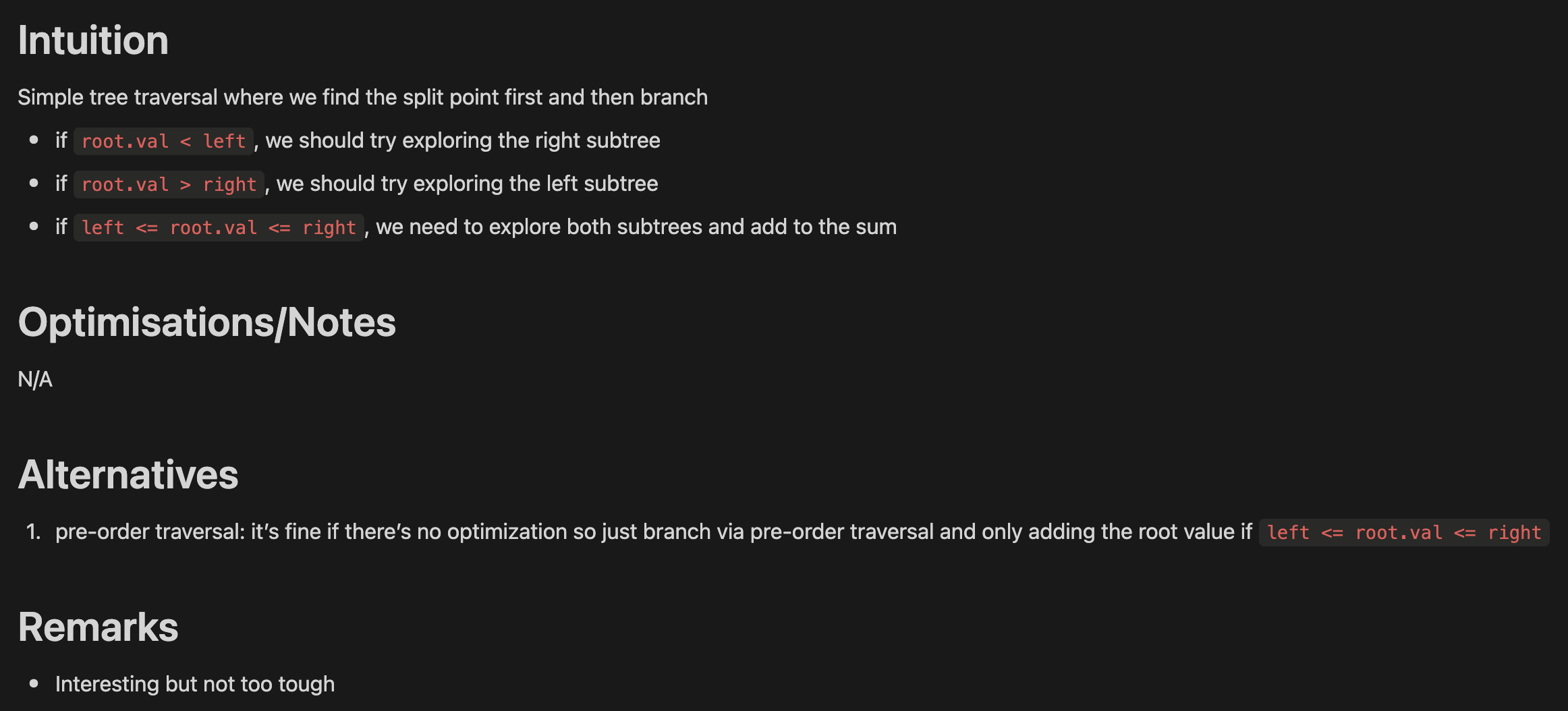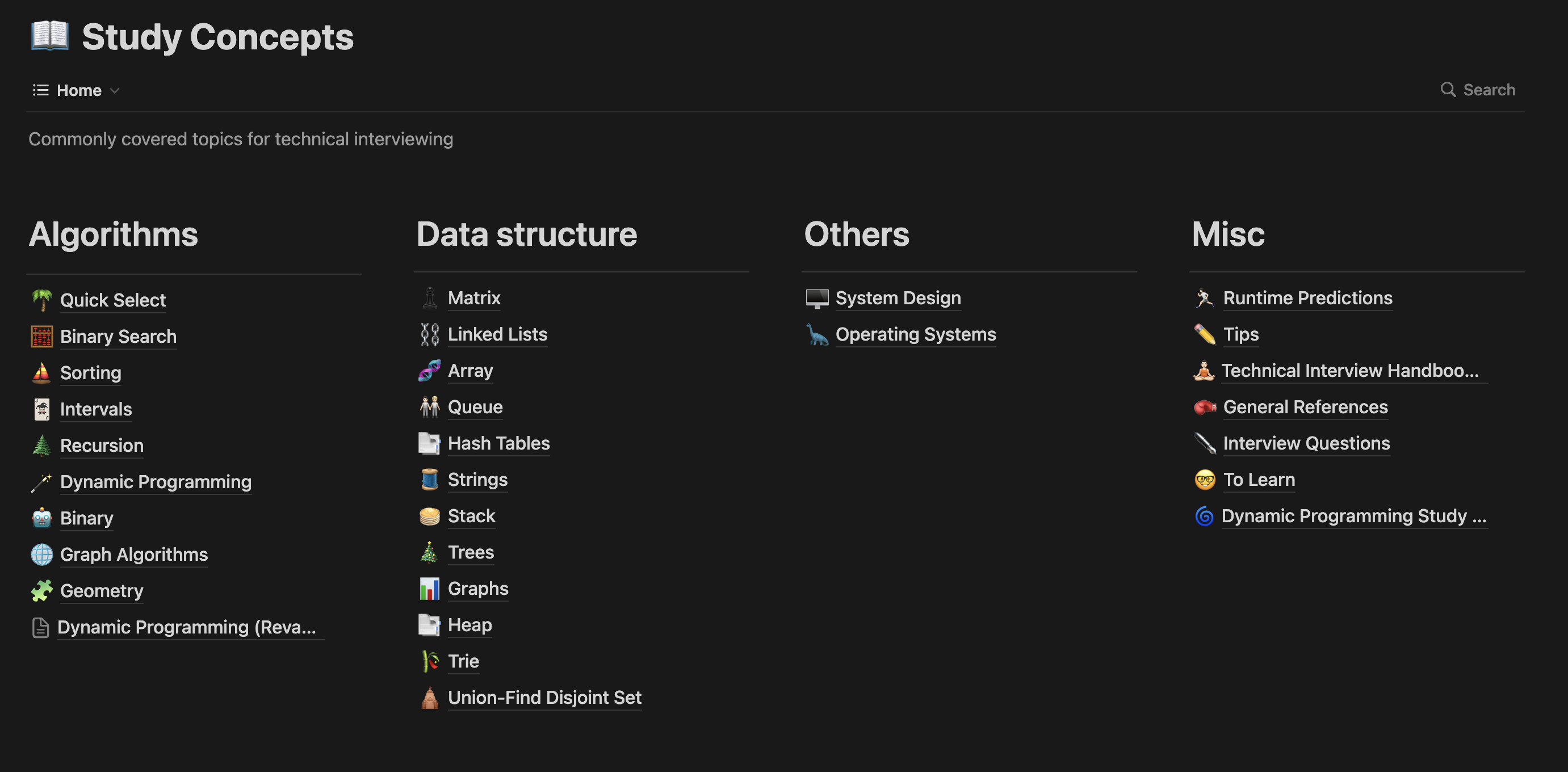30 Mar 2024
Preparing for Technical Interviews
12 min read
My friend, Devansh, recently wrote an article about “Debunking Myths Regarding Tech Internship Applications” , and I agree with many of his points. Proofreading his article gave me the opportunity to reflect on my own personal journey through internship hunting and technical interviews in summer 2024 and I would love to share more about the systems and techniques I had used to prepare for my technical interviews.
I understand that the tech industry is very volatile at the moment and a lot of my “success” this internship cycle boils down to timing and luck along with a lot of preparations. I am incredibly thankful for the offers I have received and I will never know what combination of factors led to my ultimate success.
If you are reading this and you have not had as much success so far, please do not stop trying. Keep pushing and you will definitely get an amazing offer :)
Who am I?
While you are reading this, you may be thinking to yourself, “Who is this person telling me about technical interviews?” No worries, an introduction is in order. Of course, if you are just interested in the systems and techniques, you can jump to them here.
My background
I am Jiahao, a Computer Science undergraduate from the National University of Singapore. Before entering university, I was studying Information Technology in Singapore Polytechnic.
I was also a complete “noob” at data structures and algorithms and technical interviews (my course in polytechnic never taught us these subjects). As such, while I had built several projects in my own spare time and worked with various teams, I was never well-versed in solving these data structure/algorithms problems and would struggle with even simple LeetCode easy problems (no exaggeration, I would spend an eternity trying to solve Two Sum).
First failures…
My first true exposure to technical interviews was when I had started applying for internships when I first entered university. I remember my very first online assessment (OA) was for the Grab engineering internship. Looking back, the questions really were super straightforward, yet I spent the entire one and a half hours to solve them, and I had still answered them ALL wrongly 😱.
The rest of the application cycle played out similarly, having failed many of the OAs and even when I had passed to the subsequent rounds, I would choke and fail at the live codings.
Thankfully, I still managed to secure a software engineering internship offer at Betafi where I worked with Elixir + Phoenix to improve the platform (I am very grateful to my supervisor, Ethan, for reaching out about this opportunity).
Formal exposure to data structures and algorithms
The following semester, I took the mandatory data structures and algorithms course that all CS undergraduates had to go through. It was my first real brush with proper data structures and algorithms and it instilled in me the very fundamentals of algorithmic thinking (thank you Prof Seth!). While I did not score amazingly (I got an A-), it gave me the basic tools to start exploring algorithms on my own during the summer.
Turning point
During the summer, I devised a study plan and techniques to help with my preparation for the next internship cycle, committing myself to becoming good at technical interviews (on top of juggling my internship, summer projects, and commitments with NUS Hackers).
As a result of the consistent effort, I was able to subsequently secure 4 offers (out of over 250+ applications), receiving offers from companies like Citadel, Palantir, Google, and PayPal (all of which I am extremely thankful for). While the following diagram is not 100% accurate, it hopefully gives you a rough idea on my overall success rate:

Why am I writing this?
While I am not claiming to be an absolute authority of technical interviews, I believe that my experiences, systems, and techniques had proven to be successful and as such, I would love to share more about them in this article so that you too can benefit and experience success in your own internship hunt! This article focuses on the “meta-discussion” of studying for technical interviews and the state of technical interviews in general.
If you are interested in my condensed notes for the various topics involved in technical interviews (data structures, algorithms, system design, behavioral, and resume writing), I have open-sourced my notes as a “Technical Interview Study Guide” that you can find here: https://interviews.woojiahao.com.
Technical interviewing as a skill
I broadly classify every component of the SWE/SRE interviewing process as a technical interview, so it covers the OA, initial phone screen, technical onsites, behaviorals, etc.
To me, technical interviewing is a skill. Much like how you would invest time and energy into getting good at games or your studies, I believe technical interviewing deserves similar treatment. Similarly, much like gaming or studying, there are fixed systems and techniques that you can use to streamline this process of improving.
I will talk about four key aspects of technical interview preparation that I briefly mentioned in my Technical Interview Study Guide:
Creating a good study plan
TL;DR
Understand your weaknesses, create/use a study plan, and follow a reasonable timeline
Prior to creating a study plan, you should first identify your strengths and weaknesses. Before even thinking about the questions I wanted to finish, I first sat down for about 30 minutes and thought hard about the topics that I found particularly challenging from my data structure and algorithm course and noted them down. My list looked a little something like…
- Arrays
- Linked lists
- Dynamic programming
- Greedy algorithms
- Etc…
As you can see, there is no shame in admitting that you may not be good at what some may even consider as “basic” topics (after all, you’re doing this preparation for yourself).
Once you have established what you know and what you don’t know, you can start thinking about a plan of attack (study plan). A study plan comprises of two key ingredients: a fixed timeline and an exhaustive list of subjects to cover.
Luckily, Yangshun had published a study plan on his Tech Interview Handbook, where he provides a detailed list of questions per major topic of technical interviews and a sample timeline to follow. So the first thing I did when I started was to first compile his list of questions into a Google Sheets document with a slightly adjusted timeline. I used these questions as a guideline on what to complete. I have since moved this study plan to my Technical Interview Study Guide, but this was what planning my study plan looked like in Google Sheets:

The final secret sauce is to create and follow a reasonable study plan. For me, I used the number of questions and familiarity with each topic as a gauge for how long I should spend on each topic. For instance, I felt more comfortable with a topic like recursion so I allocated just a day for eight questions, but for dynamic programming, I dedicated over five days for it (including the time to internalize and understand each solution).
You should also include the time it would take to revisit and revise topics. I usually try to revise topics about a week after having finished their questions to ensure that I’m not forgetting the key concepts.
Compiling useful notes
Once you have a study plan, you can start attempting the questions. Of course, having a systematic way of tackling problems is quintessential for learning.
TL;DR
Focus on systematically capturing the intuition of problems and jotting down recurring/unique patterns in problems
I use Notion to store my notes for every LeetCode question I have attempted since starting serious preparation. LeetCode has a built-in notetaking functionality and I know others who use tools like Google Sheets to make such notes. The medium is secondary to the actual process of notetaking and internalizing the intuition of each problem.

I recommend capturing the following “metadata” about each question:
- Concepts used
- Difficulty level (I follow LeetCode’s grading system)
- Should you redo it? (I use this to gauge if I should redo a set of questions)
- Status of completion (for instance, did you give up? Did you solve it the first try?)
- Where the question came from
These metadata speed up the process of revision and let you revisit questions/topics that you found difficult in the past.
After noting these metadata, I use a template for jotting down my notes per question. This template includes the following:
- Intuition (base intuition for solving the problem written in your own words)
- Optimizations/notes (any notable optimizations/notes to make of this problem; if I gave up, I would often include the intuition for my failed attempt here)
- Alternatives (from the LeetCode “Solutions” tab where I try internalizing multiple ways of solving a problem)
- Remarks (any remarks about the problem)
For instance, this is what my note for Range Sum in BST:

When approaching a question, try to allocate a fixed time to solve it by before looking at the solution. This varies per person. This allows you to stay on track with your timeline. However, do not just space out for the alloted time because you know you will see the answers eventually. Try really hard to come up with the solution and implementing it within the time. After seeing a solution, start by running through a few examples with the new algorithm, building a strong intuition for it. Then, start jotting down your notes for the question. Take some time to also read any alternative solutions as it allows you to learn more about different ways of approaching problems.
In addition to notes about questions, I also highly recommend notes about the topics. Much like how my Technical Interview Study Guide includes information about the common patterns in each topic, I highly recommend making your own notes for these topics (the content of the study guide comes from my own personal notes!). While you can refer to online sources for these information, having a personalized set of notes is helpful when it comes to linking concepts and revising! This was what my personal notes looked like:

Starting early
All these preparations would be in vain if you only start in the middle of the internship cycle or if you start applying late.
TL;DR
Start practicing as early as possible so that you are ready and able to apply to more roles
My personal timeline for summer 2024 was as such (taken from my Technical Interview Study Guide):
- Start of May 2023: sourcing for problems and figuring out my weaknesses when it comes to interviewing
- May 2023 to mid June 2023: working on my fundamentals by completing questions by topic
- Mid Jun 2023 to Jul 2023: working on other problems to expand my exposure and speed
- Jul 2023 to Oct 2023: start applying for roles in Singapore, US, and UK
- Aug 2023 to Mar 2024: started interviewing and received my offers
As you can see, as “kiasu” (Singaporean slang for “fear of losing”) as it is to start the moment summer starts, it is necessary if you’re attempting to cover as much breadth and achieve as much depth as possible before the internship applications open. Many large firms in the US opened while it was still the summer in Singapore and many large firms in Singapore opened soon after the summer ended.
Interviewing with a passion
It does not matter how much you prepare for the interview if you cannot convince your interviewers to want you on their team.
TL;DR
Research every company in depth and understand their business, projects, and culture and find an alignment with them
Every interview with an engineer/manager/HR with the company is a two-way conversation. It is both a way for them to get to know you as a candidate, but also for you to get to know about the company. However, in order for this conversation to be effective and meaningful for both parties, you MUST do your due diligence in understanding more about the company.
A great example is learning about a company’s open-source efforts and understanding these projects and talking to the engineers about them! I find that finding these “talking points” about the company helped me to not only appear interested in the company (because I was), but also helped me to ask meaningful questions about the company as my curiosity would drive me to want to learn more.
However, this does not just apply to knowing more about the company. Being passionate about your past experiences like past projects and internships also helps to show that you are someone who is invested. Be proactive in learning about the industry you were in, the problems you were solving, the technical and non-technical challenges you faced, and how you contributed to the team. These are all key things that help inform your perspective of these experiences and gives the interviewer the sense that you CARE about the project beyond just being a “code monkey”.

Conclusion
I have rambled for long enough.
If you were to take away just one thing from this, I hope it is this: technical interviews is a skill that takes time and dedication to improve on. You cannot expect to be amazing at it without any practice, just as you would not expect to be Magnus Midtbø when starting out climbing.
I hope that this article gives you both hope and guidance on how to navigate your technical interview preparation and I hope that my Technical Interview Study Guide can become your study buddy throughout your journey.
I am wishing you all the best and I am rooting for you! 🤩
P.S. If you have used my guide or just want to talk to someone about technical interview preparation, feel free to email me at woojiahao1234@gmail.com!
Enjoyed reading?
Consider subscribing to my RSS feed or reaching out to me through email!